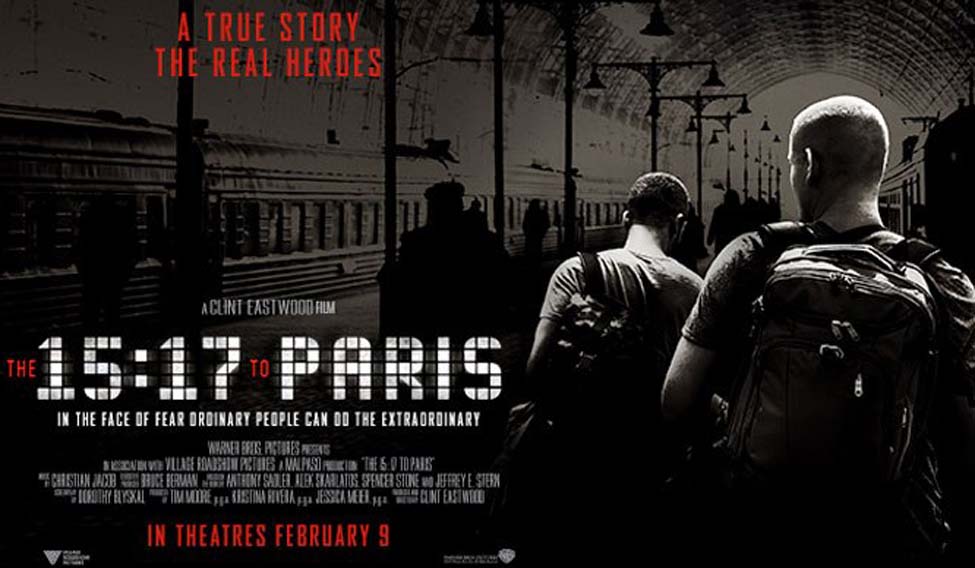"So, are you gonna tell me the story?"
"It's actually not much of a story."
"...Everyone has a story and it's their duty to tell it."
This is an actual exchange in the film The 15:17 to Paris, between one of the lead characters and his girlfriend. It has nothing to do with the movie's plot, but it sounds like something the screenwriter borrowed from director Clint Eastwood's first conversation with the protagonists.
Eastwood's latest film is supposed to narrate a heroic act that saved many lives. At least that is what the trailer and its posters try to convey. But, instead of telling you about the act, you are given a backstory of the heroes that is drab and pointless. Only in the end do you realise that, despite it being a tale of their brave deeds, there wasn't really much of a story.
The 15:17 to Paris is based on a true-life incident. In 2015, a train from Amsterdam (the 3:17pm one, duh), en route Paris, came under attack by a heavily-armed terrorist. The lone-wolf assailant opened fire, injured a few passengers, but was subdued by some of them. A couple of people were injured, but no fatalities.
The four brave hearts that neutralised the attacker—three American and one British—were conferred the Legion d'Honneur, France's highest medal of honour, for averting a major tragedy. The three Americans went on to write a memoir, detailing the events of the attack, and Clint Eastwood took over from there.
Interestingly, Eastwood got the three actual heroes to play their roles in the movie. But that turned out to be his worst decision. The stone-faced trio cannot act, and though you're telling yourself to pardon their poor acting skills, their inability to emote on screen is disturbing. Apart from being a marketing move, casting them serves no purpose.
So the acting was unbearable, and the three men can be forgiven for that, but what about the story, Mr Eastwood?
The first half haphazardly shuttles back and forth between the life of three childhood buddies—Anthony Sadler, Alek Skarlatos and Spencer Stone—and tense moments from the eventual attack in the train. This is done, presumably, to remind us about the point of this movie, but it turns out to be more annoying than anything else.
Much of the film shows the boys' struggles as they grow up. Two of them realise their dream of joining the military and later decide to go on a holiday in Europe with their third bestie. By the time the makers of the movie take you into the second half, the back and forth scenes are ditched for clips of bars and strip clubs, and you've forgotten that it is supposed to be about an incident on a train.
Some dramatic shots of the train from the outside reminds one of Source Code, another movie made in the backdrop of an attack on a train. There seems to be just one similarity with the Jake Gyllenhaal classic—the focal point of the movie happens within the span of a few minutes. That worked in Source Code, with the repetitions and all, but, in 15:17, becomes plain silly.
Eastwood, or rather the movie's writer, gives too much stress on American nationalism. Speaking of which, the efforts of the fourth hero, the Englishman, is non-existent and doesn't find a mention until then French president Francois Hollande confers him the badge of honour, right at the end.
The film is 'Adult' rated, another baffling choice, because the only thing worth censoring is the blood, in a scene towards the end. (But then, maybe Eastwood realised it would be better to spare underage children the snooze fest).
By the end of the movie, one starts to question Eastwood's commitment to the project. I would have preferred not to be harsh on the 87-year-old legend, but for some reason, the movie stinks of propaganda. This is one of those flicks where you scratch your head and wonder, “What was the need to make this?”
Incidentally, thanks once again to the screenwriter, another line from the movie answers that for us.
When two of the lead characters are touring Europe, they visit a tourist spot, which, according to their guide, is where Adolf Hitler died. The two men argue and disagree with the German guide on the actual location of Hitler's death and question his claim that it was actually the Russians who cornered Hitler. To which the tour guide replies: "You Americans take credit every time evil is defeated!"
And then, the motive becomes crystal clear.
Film: The 15:17 to Paris
Director: Clint Eastwood
Cast: Three nobodies, Judy Greer and Jenna Fischer
Rating: 1.5/5









